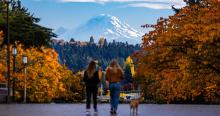Contributed by Jess Cavalari
Feelings of uncertainty are common among graduate students of all stripes, especially new students. But receiving an acceptance letter for the PhD program in history at the UW during the onset of a global pandemic was particularly surreal. Suddenly, the daily feelings of nervousness and anxiety were mixed with feelings of excitement and purpose, albeit troubled by an underlying and inescapable uncertainty. The first-year graduate students of 2020 were in a difficult position in many ways. In addition to adjusting to the now ubiquitous Zoom classroom, they needed to build cohort solidarity, connect with more-advanced graduate students, navigate the PhD committee-building process, and conduct research, all through their computer screens. Last fall these graduate students found themselves in a new place learning under entirely new circumstances. Learning and connecting with others in an entirely virtual world is certainly challenging, but despite great barriers, the faculty of the History Department provided a stable and fruitful learning environment. As the year unfolded and quarters sped by, the tasks of graduate school in a virtual world grew more manageable. Members of the history faculty demonstrated their dedication to pedagogy and fostering a learning environment by helping first-year graduate students navigate this uncertain terrain.
Despite the circumstances, the new cohort of graduate students had to find ways to connect and bond with one another to build the peer-support network that is fundamental to any graduate program. The first-year students almost immediately moved from an initial introductory email chain to a customized WhatsApp chat complete with a banner image of Vladimir Putin snuggling a puppy. The ability to easily share silly memes and videos allowed for more meaningful social interaction in a virtual setting. Normal activities such as studying together and socializing over food and drinks in the U District were replaced with a few socially distanced and masked walks, Zoom hangouts, and group-chat shenanigans. More important, though, was learning to navigate the professional aspects of a virtual history graduate program, such as archival research and professional network building. In these tasks, the faculty in history went above and beyond in providing support to the new graduate students.
When asked about their experiences with their advisors, the first-year graduate students expressed gratitude for the support they received. Even while rethinking their entire approach to teaching, the UW history faculty made themselves available to the new graduate students in a variety of ways, from holding weekly Zoom meetings to orchestrating virtual introductions with other graduate students and professors to leading covid-conscious walking tours of campus. “Our faculty managed to carve out an alternative learning space for us to learn the craft of history and rethink the methods of research in a digital age,” one first-year graduate student remarked, “and provided us with all kinds of accommodations to make us feel more confident about our nascent research.” Another student explained how “our mentors consistently exuded a calming aura, guiding us through our first year with a steady hand. Our professors were so skilled at normalizing our experiences.” In spite of their first year being entirely remote, history faculty ensured that the first-year graduate students still received the guidance that they required.
Perhaps the most daunting task for first-year students in history at the UW is completing the research seminar that spans the winter and spring terms. In this endeavor the new students benefited immensely from the guidance of Professor Josh Reid. “Professor Reid’s guidance in the research seminar was indispensable to my first year,” one student explains. “He made the absolute best of Zoom-bound learning, and he made ample room for graduate students to voice all of their needs. He was so diligent in providing extensive answers to all of our questions about the nuts and bolts of historical research and writing.” Moreover, Professor Reid was incredibly conscious of the difficulties posed by conducting archival research remotely. He spent many weeks facilitating discussions about sources, about when and how to contact archivists with inquiries, and about where to look for digital materials. In the end, the research seminar was perhaps even more rewarding than in past years, given that it armed the now second-year graduate students with new modalities of learning, researching, and working together.
